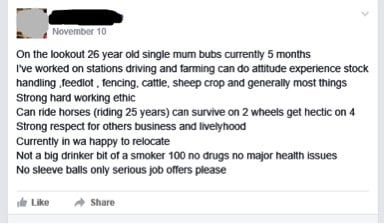As a prospective job applicant you have only one chance to catch an employer’s eye. I am sure this is not news to you. I am also sure that you have been given an overabundance of advice on how to craft a resume and present yourself at an interview. While this is valuable information, when I am recruiting it counts for far less than you might realise.
A bit about myself, then. I, along with my partner, own and operate a cattle station in remote outback Australia. The work we offer is challenging, physically demanding and – at times – downright hard. It’s not for everyone but for those who thrive in an outdoor, practical environment it can be incredibly rewarding.
It is nothing like the romantic version you may imagine if your total knowledge of the outback derives from movies like ‘Australia’ or television shows such as ‘McLeods’s Daughters’. It is hot, dusty, often back-breaking work in tough conditions. It can break your heart and batter your spirit. It will test you beyond your preconceived notions of your limits and some days it will simply chew you up and spit you out.
But it will also make you as a person. You will discover what you are really made of and who you really are. You will develop skills that will stand you in good stead for the rest of your life and come to realise that you are capable of so much more than you ever realised. It can also be fun.
For animal lovers there is always livestock and sometimes working dogs and horses, pets or even orphaned wildlife to enjoy. For nature lovers, there are native plants, animals and breathtaking landscapes to savour. For the socially-minded, there are mates to be made, good times to be had and tall tales to tell. And it is all on your doorstep.
Whether it be for just a gap year or the rest of your life, working on a station offers an opportunity to get beyond the familiar confines of the coastal fringe and into a completely different Australia. For a lot of young people based in the city it is the ultimate adventure.
However a common question I come across is, how does someone with no rural background and no relevant skills get a start on a station? Surprisingly, it doesn’t have to be as difficult as you might think. The right attitude and a bit of grit will take you a long way. Having said that, a ridiculous number of job seekers manage to irredeemably destroy their chance of finding a job before they even start.
So, if you thing there may be life beyond the peak-hour commute, open-plan cubicle and relentless grind of meetings and report writing, here are a few tips and traps for young players that will help you kick-start your life in the great beyond.
- Social media is your friend
While there are a number of corporate cattle stations that implement formal recruitment processes, the majority of stations are family-owned and run enterprises. These businesses don’t have HR departments to vet applicants, nor do they have extensive budgets to advertise positions. As a result, sites such as GumTree and Facebook play a critical role in sourcing potential employees. There are a number of pages on Facebook solely dedicated to matching aspiring station staff with employers.
Many stations also have their own Facebook page so you can research potential employers. Sites such as centralstation.net.au are also an invaluable source of information. This particular web-site hosts blogs for a large number of cattle stations across northern Australia. Believe me, there is no surer way of finding out what potential future employers consider important than reading what they have taken the time to write about.
Ignore this information at your peril. If a station prides itself on its low-stress stock handling techniques, don’t talk about how all you want to do is throw wild bulls. If the station expressly states they don’t use horses, don’t go on about how much you love horses or how much you want to learn to ride. If you’re hell bent on attending rodeos and B&S balls every weekend, don’t apply for jobs in isolated areas. A little bit of research on your behalf can save everyone a whole lot of heartache down the track.
- Social media is your enemy
Of course, social media works both ways. Once you post you are only a click away from having a potential employer enquire into your personal life. This is not as seedy as it sounds. I am not only looking for someone to work for me but – due to the remote nature of our property – also someone who will live with us. I need to feel comfortable that whoever I employ will fit with our family and share similar values. A profile that has an undue amount of swearing, celebrates excessive drinking and partying then whinges about having to show up for work the next day or otherwise glorifies any form of general stupidity, is instantly dismissed from consideration.
- Selling yourself
Despite past experience, I am constantly amazed at the complete lack of care people put into advertisements and job applications, particularly when they have no industry experience. Your mother may laud your every move but in the real world there are no ribbons for participation. You have to make an effort.
While I don’t expect employees to be Rhodes Scholars, I do expect a basic level of communication skills, particularly when using electronic media. There is not a computer in the world that doesn’t have spell check. Use it. Use punctuation and don’t ever think it is OK to use text-speak. This is fine with your mates, but I’m not recruiting BFFs. I am looking for an employee who will take the job seriously and behave in a professional manner. If you have a genuine problem with reading and/or writing, ask for help. Whether it be friends, family or your local job resource centre, there are plenty of people out there willing and able to offer assistance.
Automatic fail. If you’re not willing to put any effort into getting a job what reason do I have to believe you would put any effort into doing the job?
- Making demands
Employment is – and should be – a two-way street. Staff deserve a fair day’s pay for a fair day’s work. They also have a right to be treated with respect. As do employers. When hiring staff for our station I am looking for someone who understands this concept.
A surprising number of inexperienced job seekers expect to be able to dictate the terms of their employment. “Must allow dogs” is a particular pet hate of mine. Right now, you have nothing to offer me. In fact, I will need to invest a significant amount of time, effort and energy in getting you up to speed with the job. Making demands about the terms of your employment suggests to me that you are an over-entitled, over-indulged brat and I have zero interest in what you seem to think you deserve. Keep looking.
Once you have experience – and a reputation to back it up – it may be possible to negotiate on conditions. However, it is important to realise that a station only works if everyone is on the same team. Every property will be different and whether you like it or not the boss will want things done a certain way. If there are issues on which you simply won’t compromise (such as family accommodation, horses or dogs), that’s fine, but how you post is just as important as what you post. I am only willing to interview someone if I feel they are willing to work with me.
Even though this couple have experience, they seem way too demanding to warrant consideration.
Another concept that always make me shake my head is when a single mother or couple with young child/ren are looking for work and expect a full time position/s. While a station is a great place to raise a child and some stations do offer (usually senior) positions that are suitable for families, you still need to be practical. There are no day-care centres out here and no-one is going to employ a nanny on your behalf.
I don’t know where to even start with this one. Apart from the typos, punctuation and grammar, I can’t imagine who she thinks will look after the baby while she is getting ‘hectic on 4’ (wheels I assume). And seriously – sleeve balls?
As an employer I am looking for someone who wants to make a genuine go of the job. I am not interested in anyone who thinks I am only here to provide them with a lifestyle. I may live where I work but I am still running a business and I expect value for money from my employees.
- Denigrating your current employer
Not surprisingly, this is career suicide. Whether it’s on social media or at the local rodeo, airing you dirty laundry in public is just plain stupid. I am a firm believer that there are three sides to every story – what you said, what they said and what actually happened (which is usually somewhere in the middle). In addition, there is a good chance I know, know of, or know someone who knows, your employer. If your trash talk happens to be about someone I consider reputable, you have instantly become unemployable.
Really? Ever stop to think that perhaps your boss – the ‘weiner’ – may also follow this page?
Admittedly, as in every industry there are some bad apples and should you find yourself working for one just pack up and move on. However, if you are just sulking because you have been reprimanded for something you shouldn’t have done in the first place, you should reconsider your suitability for the industry.
Another really stupid move is to canvas other stations for a job when at a training course – particularly if it has been paid for by your boss. This shows a complete lack of integrity. It tells me you have no loyalty, can’t be trusted and either won’t recognise or won’t appreciate opportunities when they arise. Whatever the case, there is no place for you on my team.
Some of the above advice may sound harsh. Well, life can be harsh. When applying for a job it’s not about you. The employer will be looking for a particular set of attributes and if you can’t demonstrate you have what it takes then you don’t deserve consideration for the position.
It’s a competitive job market out there and how you conduct yourself online is just as important as how you conduct yourself in the real world. For me, it is all about inner grit. I can teach skills, I can’t teach attitude. And I’m not alone. One of the great things about the cattle industry is that if you work hard enough and show enough determination, you will eventually find someone prepared to cut you a break. Where you go from there is entirely up to you.











